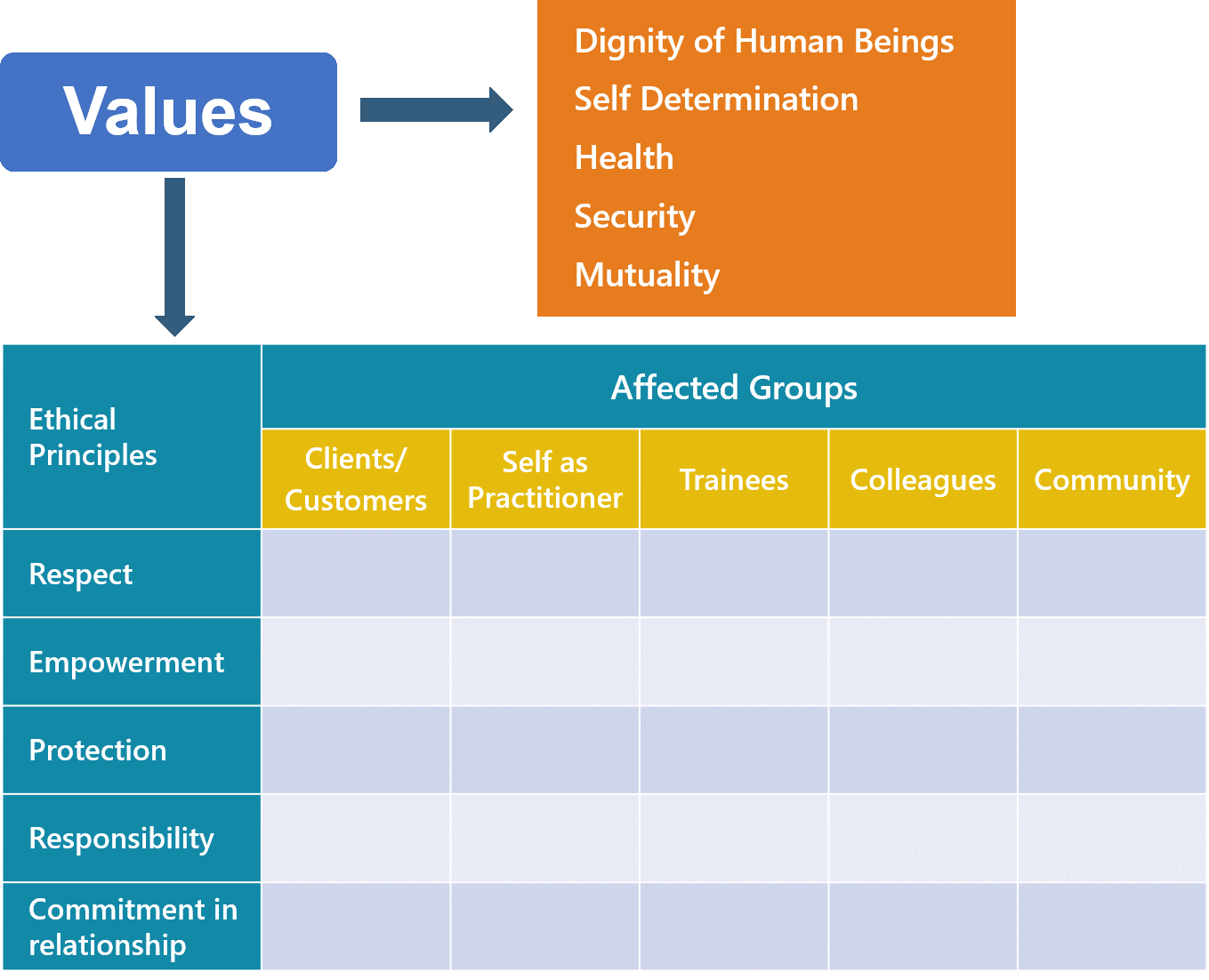Synthesis of Ethical Values and Principles from the EATA Ethics Manual and the United Nations Declaration of Human Rights
The ITAA Ethical Values and Principles have largely been adapted from the EATA Ethics Manual and the United Nations Declaration of Human Rights.
Values are the fundamental basis on which human beings promote their own personal development and fulfilment as well as that of others. Values include reference to natural law that informs how people behave respectfully toward self and others. The following identified values are related to human rights and are included in the Universal Declaration of Human Rights.
This frame of reference is also congruent with the existential and philosophical perspective of transactional analysis. Many values can be extrapolated, so the following list will not be considered exhaustive by Practitioners.
Considering the range of activities involved, the fundamental values are
Ethical Principles
Because of the nature of values and their significance in human life, and in order to guarantee the respect and rights of each person, it is necessary to identify clear guidelines for behaviour that are linked to values. Ethical principles are derived from values and are intended as an indication of how to behave so as to promote the well-being, development, and growth of the individual. They are prescriptive and offer criteria for ethical behaviour.
Using values as the starting point, it is possible to determine a set of ethical principles. The principal ones are:
- Respect
- Empowerment
- Protection
- Responsibility
- Commitment in relationship
Within the helping professions, ethical principles need to address many affected groups in order to influence ethical behaviour. The main ones are:
- Clients/Customers (these can be individuals, and/or groups as in Education and Organisations)
- Self as Practitioner
- Trainees
- Colleagues
- Human environment/community
ITAA members will consider each value and the ethical principles that derive from it and self-reflect in order to decide what attitude to take and how to behave as a member of the group to which they belong. They will analyse a given situation, consider the influence of ethical principles on their practice, and choose behaviours that take into account a wide variety of factors, including client/customer, self, and environment.
After a brief definition of each ethical principle, various examples are provided that illustrate how it might be applied to each affected group. It is given that transactional analysts will operate within a contractual framework with the affected groups.
The examples are not exhaustive, rather they are prompts and stimuli to enable Practitioners to consider how to apply the principles to their practice.
Respect for each person as a human being, aside from any specific characteristic or quality
Empowerment that emphasizes the importance of enhancing the growth of each person
Protection implies taking care of both self and others (physically and psychologically), bearing in mind the uniqueness and worth of each individual.
Responsibility implies taking into account the consequences of our own actions as clients, trainers, , counsellors, educators, consultants, therapists, and supervisors.
Commitment in relationship means members are mindful of the social and interpersonal contexts of relationships and endeavour to uphold agreements with others.
In order to make an ethical decision, Practitioners take account of the ethical principles so they can evaluate various situations and take appropriate considered action. Where Practitioners find themselves in , situations in which it is not possible to reconcile all the applicable principles, with challenging and supportive supervision, the Practitioner will, after full consideration of the different perspectives be accountable for their decision and action. Guidelines for the Application of Values and Ethical Principles.
Principles such as those above provide a useful framework for understanding conflicts but do not provide answers for handling particular situations. This section is designed to be a bridge to ethical contractual services. A graphic is provided to help Practitioners visualize the complexity required in applying the code to practice.
In all these situations, supervision is always recommended; a place where honesty, respect as well as challenge and support are provided so the Practitioner is able to take into account their own perspectives, skills and abilities as well as their potential bias, prejudice so the best possible outcomes are proposed.
A Grid for Ethical Assessment

Examples of how you might use the grid
This grid can be viewed as a potentially useful visual aid for thinking about prospective ethical dilemmas. Its purpose is to encourage practitioners to consider the values implicit in each principle in relation to a particular context, as opposed to it being regarded as a formulaic, tick-box method of decision making.
Ethical decisions that are strongly supported by one or more of the above ethical principles, without any contradiction from other principles, may be regarded as reasonably well founded. In addition to these principles and values, members are expected to consider legal, contractual, or clinical issues and ethical concerns in relation to the ethical dilemma under consideration.
However, Practitioners including educators, and consultants are bound to encounter circumstances in which it is impossible to reconcile all the applicable principles, and thus, choosing between principles may be required. In many cases, Practitioners balance the relevance of one principle against one or more of the others. Likewise, a decision or course of action does not necessarily become unethical merely because it is contentious in the eyes of other practitioners, educators or consultants who would have reached different conclusions in similar circumstances. Even for experienced practitioners, educators, and consultants, supervision or consultation is highly recommended.
Comparing the Previous ITAA Code of Ethical Conduct (5 December 2014) with this Revised Ethics Code
The Ethics Committee’s vision for the future is to move ethics from a position of being hidden and stigmatised, where members view ethics as relevant only when there are perceived negative, right or wrong behaviours, to fully integrating the psychological aspects of all affected group relationships. The aim is to normalise ethics as integral to a holistic TA environment.
This paradigm shift from ‘must do and/or not do’ to ‘living by the principles’ changes the dialogue from Parent ego state which invites compliance (from Child Ego state) to dialogue between Adult ego states.
The new paradigm invites both Petitioner and Respondent to reframe ethical practice on the procedural, professional, and psychological levels (moving away from defensiveness, guilt, fear and/or shame) to constructive dialogue, learning and healing. The shift also supports the procedures of raising an ethical concern and conducting formal ethical procedures.
The 12 clauses from the previous manual were written as follows:
‘The following clauses imply or explicitly state what practitioners must do and/or not do. The aim is to ensure that the process of framing, investigating, and adjudicating complaints is fair and transparent.
- ITAA members acknowledge the dignity of all humans, regardless of their physiological, psychological, sociological, or economic status. (Now Under the Principle: Respect).
- It is the primary protective responsibility of ITAA members who are providing contractual services to offer their best possible services to clients, trainees, and supervisees and to act in such a way as to cause no intentional or deliberate harm to any client, trainee, or supervisee. (Now under the Principle: Responsibility).
- ITAA members who use transactional analysis should strive to develop their clients’ awareness of and functioning from a position of dignity, autonomy, and personal responsibility. (Now under the Principle: Empowerment).
- The ethical application of transactional analysis involves entering into an informed contractual relationship that the ITAA member and the client should have the competence and intent to fulfill. When a client is unable or unwilling to function autonomously and responsibly within this contractual relationship because of mental impairment or intentional reckless behaviour, the ITAA member must resolve this relationship in such a way as to bring no harm to the client. (Now under the Principle: Protection).
- ITAA members who are providing contractual services will not exploit a client in any manner, including, but not limited to, financial and sexual matters. Sexual relationships between an ITAA member and his/her clients, trainees, or supervisees are prohibited. (Also included under Principle: Protection).
- An ITAA member will not enter into or maintain a professional contract whereby other activities or relationships between that member and a client might jeopardize the professional contract. ITAA members are expected to minimize dual roles and to seek consultation from trusted colleagues and respected supervisors when faced with potential dual roles. (Also included under Principle: Protection).
- The professional relationship between an ITAA member and a client is defined by the contract, and that professional relationship ends with the termination of the contract. However, certain professional responsibilities continue beyond the termination of the contract. They include, but are not limited to: (a) maintenance of agreed-on confidentiality; (b) avoidance of any exploitation of the former relationship; and (c) provision for any needed follow-up care. (Now under Principle: Responsibility).
- ITAA members will operate and conduct services to clients with full responsibility to existing laws of the state and/or country in which they reside, provided such laws are not in conflict with the United Nations Declaration of Human Rights and the ethical principles of the ITAA. (Now under the Principle: Responsibility).
- In establishing a professional relationship, ITAA members assume responsibility for providing a suitable environment, including such things as specifying the nature of confidentiality observed, providing for physical safety appropriate to the form of activity involved, and obtaining informed consent for high-risk procedures that could possibly have harmful effects. Informed consent includes informing the client of his/her right to refuse to participate in any procedures and/or to end the professional contract at any time. ITAA members will also seek to ensure the protection of clients’ confidentiality regarding personal information conveyed through electronic transmission. (Now under Principle: Commitment in relationship).
- ITAA members will, in their written and/or verbal public statements, refrain from derogatory comments, inferences, and/ or innuendoes that disparage the standing, qualifications, or character of other people, bearing in mind their responsibility as representatives of the ITAA and of transactional analysis. On the other hand, direct personal and objective feedback is welcomed. (Now under the Principle: Responsibility, and equally under Respect, and Commitment in Relationship).
- If ITAA members become aware that personal conflicts or medical problems might interfere with their ability to carry out a contractual relationship, they must either terminate the contract in a professionally responsible manner or ensure that the client has the full information needed to make a decision about remaining in the contractual relationship. (Now under Principle: Commitment in relationship).
- ITAA members accept responsibility for confronting any colleague whom they have reasonable cause to believe is acting in an unethical manner and, failing resolution, may report that colleague to the ITAA Ethics Committee or Board of Trustees. On occasions when members have concerns about potential cultural, professional, or personal consequences of confronting a colleague’s behaviour, they are advised to seek consultation with respected supervisors to find ethical solutions in accordance with these values and principles. (Now under Principle: Commitment in relationship).’

